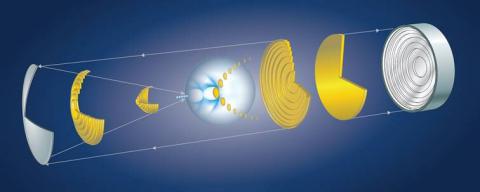 By observing electrons that have been accelerated to extremely high energies, scientists are able to unlock clues about the particles that make up our universe
By observing electrons that have been accelerated to extremely high energies, scientists are able to unlock clues about the particles that make up our universe
Por: Lindsey Valich, University of Rochester, Phys.org. Acesse aqui a matéria original.
In a paper published in Physical Review Letters, scientists at the University of Rochester's Laboratory for Laser Energetics (LLE) outlined a method to shape intense laser light in a way that accelerates electrons to record energies in very short distances: the researchers estimate the accelerator would be 10,000 times smaller than a proposed setup recording similar energy, reducing the accelerator from nearly the length of Rhode Island to the length of a dining room table. With such a technology, scientists could perform tabletop experiments to probe the Higgs boson or explore the existence of extra dimensions and new particles that could lead to Albert Einstein's dream of a grand unified theory of the universe. Saiba mais...
Imagem: H. Palmer and K. Palmisano

